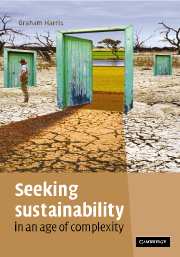Book contents
- Frontmatter
- Contents
- Acknowledgements
- 1 Preamble: the world we are in
- 2 Complexity and complex systems
- 3 New science, new tools, new challenges
- 4 The complexity of ecology
- 5 The generation of complexity
- 6 Micro-interactions and macro-constraints
- 7 A sense of place
- 8 Created landscapes and our changing sense of place
- 9 Catchment form and function
- 10 Catchment loads: ecosystem impacts
- 11 Change detection, monitoring and prediction
- 12 Evidence, uncertainty and risk
- 13 Modified landscapes: biodiversity
- 14 Function in fragmented landscapes
- 15 Environmental flows
- 16 Evidence for global change
- 17 Values and beliefs
- 18 Managing environmental, social and economic systems
- 19 Linking multiple capitals in a changing world
- 20 Community, capacity, collaboration and innovation
- 21 A new environmental paradigm
- 22 Emergent problems and emerging solutions: developing an ‘ecolophysics’?
- 23 Avoiding collapse
- Index
20 - Community, capacity, collaboration and innovation
Published online by Cambridge University Press: 21 March 2011
- Frontmatter
- Contents
- Acknowledgements
- 1 Preamble: the world we are in
- 2 Complexity and complex systems
- 3 New science, new tools, new challenges
- 4 The complexity of ecology
- 5 The generation of complexity
- 6 Micro-interactions and macro-constraints
- 7 A sense of place
- 8 Created landscapes and our changing sense of place
- 9 Catchment form and function
- 10 Catchment loads: ecosystem impacts
- 11 Change detection, monitoring and prediction
- 12 Evidence, uncertainty and risk
- 13 Modified landscapes: biodiversity
- 14 Function in fragmented landscapes
- 15 Environmental flows
- 16 Evidence for global change
- 17 Values and beliefs
- 18 Managing environmental, social and economic systems
- 19 Linking multiple capitals in a changing world
- 20 Community, capacity, collaboration and innovation
- 21 A new environmental paradigm
- 22 Emergent problems and emerging solutions: developing an ‘ecolophysics’?
- 23 Avoiding collapse
- Index
Summary
The ability to understand and manage complex problems, the role of individual and community capacity: innovation, integration and synthesis, future communities.
An ethical, system-based approach that acknowledges many ways of knowing is a very new way to operate for many people. It is essential to examine and be open to the position of the other: other beliefs, cultures, values and ways of knowing. This is the only truly ethical position to take. It is so much easier to argue from a narrower position of simplistic belief and conviction, which provides a false sense of certainty and security. This is particularly true if instrumental reason is employed (and it often is). The acknowledgement of the need for an ethical system framework places a strong emphasis on listening, on relationships and on learning and adapting at the levels of individuals, communities and institutions. Working as part of a complex adaptive system requires individuals and institutions to be facilitators rather than the more usually observed modus operandi of command and control. Indeed, and exactly as Handy foretold, this is an age of unreason, of choice and flexibility, of the importance of little things and the effects of small decisions writ large. Nevertheless this is also the age of inclusion and ethics, so even small decisions must be couched in the landscape of context, consultation, networks and relationships.
- Type
- Chapter
- Information
- Seeking Sustainability in an Age of Complexity , pp. 280 - 293Publisher: Cambridge University PressPrint publication year: 2007



